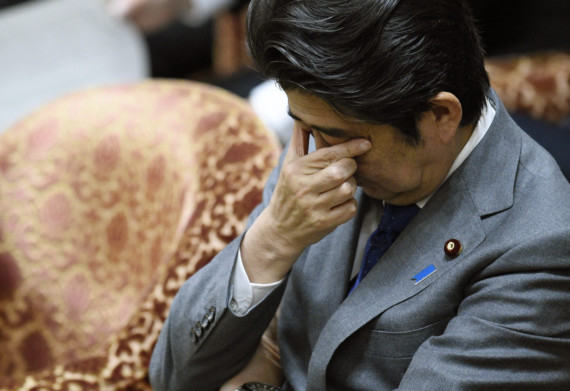
TOKYO: An angry Japanese prime minister on Wednesday slammed as “utterly despicable” an Daesh militant threat to kill both a Japanese hostage and a Jordanian pilot unless Amman releases a jihadi bomber.
The clock was ticking towards the 24-hour deadline Daesh militants set in their latest chilling video, which warned they will execute freelance journalist Kenji Goto and airman Maaz Al Kassasbeh if they do not get their way.
“This was an utterly despicable act, and I am appalled,” Japanese premier Shinzo Abe told reporters. “I have instructed all ministers to work together for the early release of Mr Kenji Goto.”
“The government, in this extremely serious situation, has been asking for the Jordanian government’s cooperation towards the early release of Mr Goto, and this policy remains unchanged,” he earlier told ministers.
Tokyo has appealed for Jordan’s help since a video emerged at the weekend in which the extremist group announced it had murdered Haruna Yukawa, a self-employed contractor it had kidnapped in August.
After initially demanding a $200 million ransom for the release of the two Japanese men, the group, which rules swathes of Syria and Iraq with a medieval form of Islam, said it wanted Jordan to free Sajida Al Rishawi, a would-be suicide bomber who has been on death row since 2006.
Analysts said the changing demands were an attempt to divide close allies of the US-led fight against extremism in the Middle East.
They say the Daesh group is forcing Jordan into the position of trying to balance strong domestic pressure to bring its airman home with wariness of harming its important relationship with deep-pocketed Japan.
Kassasbeh was captured by IS on December 24 after his F-16 jet crashed while on a mission against the jihadists over northern Syria.
Respected war reporter
In the latest video, Goto, a respected war reporter, is seen holding a photograph of Kassasbeh, while a voiceover, purportedly spoken by the Japanese hostage, warns that Jordan is blocking his release.
The narrator says both captives will be killed within 24 hours if Rishawi is not freed, and urges the Japanese government to put pressure on Jordan.
Goto’s mother, Junko Ishido, was at parliament Wednesday in a failed bid to meet with Abe.
After having been refused an appointment with the premier, she issued a plea for her son’s life through assembled media.
“Prime Minister Shinzo Abe, please save Kenji’s life,” Ishido said. “Please continue your utmost efforts in negotiating with the Jordanian government until the last minute. There is not much time left,” she said.
Japan’s deputy chief cabinet secretary Katsunobu Kato earlier indicated the government believed the new video was genuine.
Asked exactly when the 24-hour deadline expires he told reporters: Our government first noticed the message at 11pm, Japan time, (1400 GMT) on Tuesday.”
Tokyo on Tuesday appeared to be laying the ground for what it hoped could be the release of both men, taking on the Jordanian pilot’s cause.
“Both countries are closely cooperating towards the return of each of them to their countries,” deputy foreign minister Yasuhide Nakayama told reporters in Amman.
Jordan’s King Abdullah pledged full cooperation with Japan during a meeting with Nakayama to ensure Goto’s release, Tokyo said.
Tokyo is likely to face resistance from Washington over any kind of swap.
Asked about recent developments, US State Department spokeswoman Jen Psaki said a prisoner exchange was “in the same category” as paying a ransom.
Rishawi, who is Iraqi, was sentenced to death by a Jordanian court in September 2006 for her part in triple hotel bombings in Amman the previous year that killed 60 people, mainly Jordanians.
The Daesh group has previously beheaded two US reporters, an American aid worker and two British aid workers, and committed numerous atrocities, including mass executions, but the killing of Yukawa was the first time a Japanese national has been targeted.












